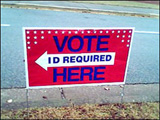Arizona Court Says ‘Yes’ To Proof-Of-Identity, ‘No’ To Proof-Of-Citizenship
Post Views 1
However, the court also ruled that the state cannot insist that voters show proof of U.S. citizenship to register to vote in federal elections, a decision the state’s attorney general said he would appeal.
“The court upheld the requirement that persons wishing to vote must show identification at the polling place. The part we will have to appeal deals with registration. We always expected the U.S. Supreme Court to have to decide this one.” “The people of Arizona have a right to request that people registering to vote show some evidence they are citizens and we fully expect the U.S. Supreme Court to uphold that,” he added.
Plaintiffs in the suit hailed the ruling to strike down the proof of citizenship requirement as vindication of their claims and called it a victory. The lead plaintiff in the case, Jesus Gonzalez, was a newly naturalized U.S. citizen whose attempts to register to vote, were rejected twice, because state officials said they could not confirm his citizenship.
“Today’s ruling vindicates all the U.S. citizens who were improperly rejected for voter registration in Arizona,” said Nina Perales, vice president of litigation for the Mexican-American Legal Defense and Educational Fund.
The US Court of Appeals for the Ninth Circuit agreed that Arizona was within its rights to ask for identification at polls, but its demand for proof of US citizenship ‘superseded the law’s requirements that anyone registering to vote in a federal election show “satisfactory evidence” of U.S. citizenship.
Concerns over voting by illegal immigrants have made such rulings very contentious and are hotly debated and challenged in courts. These rulings will continue to be contentious, even as the high court hear arguments, next week, over what the state is doing to prevent illegal immigration.
Opponents contend that the voter identification requirement is a bothersome hurdle that the minority community have difficulty in surmounting, whilst its advocates say that it is a safeguard against non-citizens casting their votes.
The compulsory voter identification laws, now enacted by a number of states, have set off a debate whether it will limit accessibility to the polls. According to data from the National Council of State Legislatures, thirty states have enacted laws that make it mandatory for voters to show some type of identification to vote in November.
The court’s majority said, that Judge Sandra Ikuta’s opinion of the Arizona law’s photo identification requirement, “is not an invidious restriction, and does not violate the 14th Amendment’s equal protection clause.”
However, the court did not concur with Arizona’s arguments in favour of proposition 200’s proof of citizenship requirements. Judge Ikuta wrote, “In sum, the NVRA and Proposition 200’s registration provision … do not operate harmoniously as a single procedural scheme for the registration of voters for federal elections. Therefore, under Congress’s expansive Elections Clause power, we must hold that the registration provision … is pre-empted by the NVRA.”
Arizona Court Says ‘Yes’ To Proof-Of-Identity, ‘No’ To Proof-Of-Citizenship by Harrison Barnes

